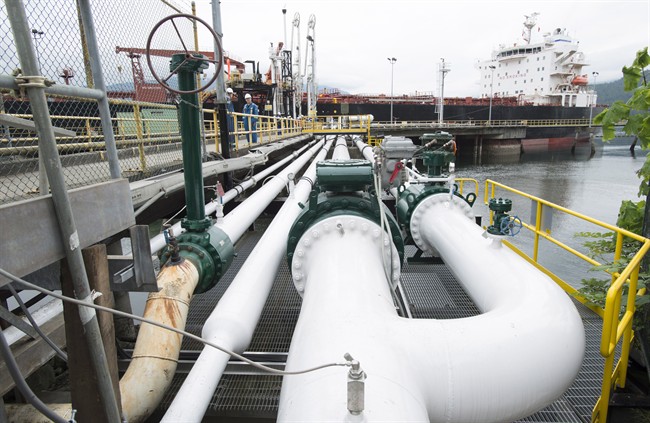Asthma, cancer, fire and contaminated water sources are among the risks to Canadians the federal government needs to consider before approving the Kinder Morgan Trans Mountain oil pipeline expansion.

That’s the warning from a group of doctors as well as a new report examining what can go wrong with pipelines, and the disastrous effects they can have on the health of people and on the environment.
READ MORE: Alberta names its price for a federal tax on carbon: Trans Mountain pipeline expansion
“The Kinder Morgan pipeline would not only double the number of fuel storage tanks creating an unacceptable risk to peoples’ health from fire, but a rupture or spill could spread toxins into the community, causing acute and long term health effects from asthma to cancer,” said Dr. Tim Takaro, a doctor and professor at Simon Fraser University, in the release.
“The cumulative health impacts of the Kinder Morgan pipeline need to be evaluated, and not by the company, before any rational decision can be made.”
The pipeline snakes its way from Edmonton to Burnaby, on the B.C. coast, going through a number of communities along the way. The proposed expansion would triple the pipeline’s capacity to 900,000 barrels a day, and cost $6.8 billion.
WATCH: Global News’ ongoing coverage of the proposed expansion of the Trans Mountain pipeline.
“This project comes with a significant risk of accidents,” the report states.
“And Kinder Morgan’s existing pipeline is no stranger to accidents: 82 reported spills since 1961, which translates to over 6 million litres released into British Columbia’s environment.”
TIMELINE: Key dates in history of the Trans Mountain pipeline
The pipeline will transport diluted bitumen, called dilbit. A type of heavy crude oil, dilbit contains various toxicants, some of which are classified as Group 1 carcinogens “with no known safe threshold of exposure,” the report states.
The expansion also puts into jeopardy the health of dozens of First Nations communities, 61 of which are opposed to the expansion.

The Salish Sea will see a seven-fold spike in oil tankers, according to the report, with the project generating 14 to 17 megatonnes of carbon in upstream emissions.
“Globally, the World Health Organization asserts climate change is the biggest human health threat of our time, but climate change was not considered in Kinder Morgan’s review process,” the report states.
READ MORE: City of Vancouver files court challenge of Trans Mountain pipeline
Trans Mountain said health and safety of the communities along the pipeline is its “top priority,” in an email to Global News.
“As part of our proposed expansion, Trans Mountain conducted Human Health Risk Assessments and provided extensive evidence to the National Energy Board about the nature and extent of possible health impacts as a result of the project and project-related marine traffic,” said Ali Hounsell, Trans Mountain Expansion Project.
FULL COVERAGE: Trans Mountain Pipeline Expansion
The board was satisfied with Trans Mountain’s evaluation of the expansion’s effect on human health, in line with recommendations of safe exposure limits set by authorities such as Health Canada and the US EPA, Hounsell said.
“The board determined that additional assessment is not required.”
“The board also concluded that for the construction of the Project and for routine operation of the pipeline, pump stations and tank terminals, adverse health effects would not be expected.”
In May, the National Energy Board gave the project approval, subject to 157 conditions.
A federal panel was created to consult with Canadians in 10 communities on the pipeline; more than 35,000 people submitted feedback on the expansion via an online questionnaire. The panel is due to submit its report to the minister of natural resources by Nov. 1, and the Trudeau government is expected to make its final decision on the project by Dec. 19.
- Ont. First Nation calls for chemical plant to be shut down amid ‘dangerously high’ benzene levels
- Ottawa looks to launch national flood insurance program within 12 months
- Ecuador rations power, declares emergency as drought limits hydro output
- Nova Scotia scraps spring bear hunt idea, public ‘very divided’ on issue










Comments